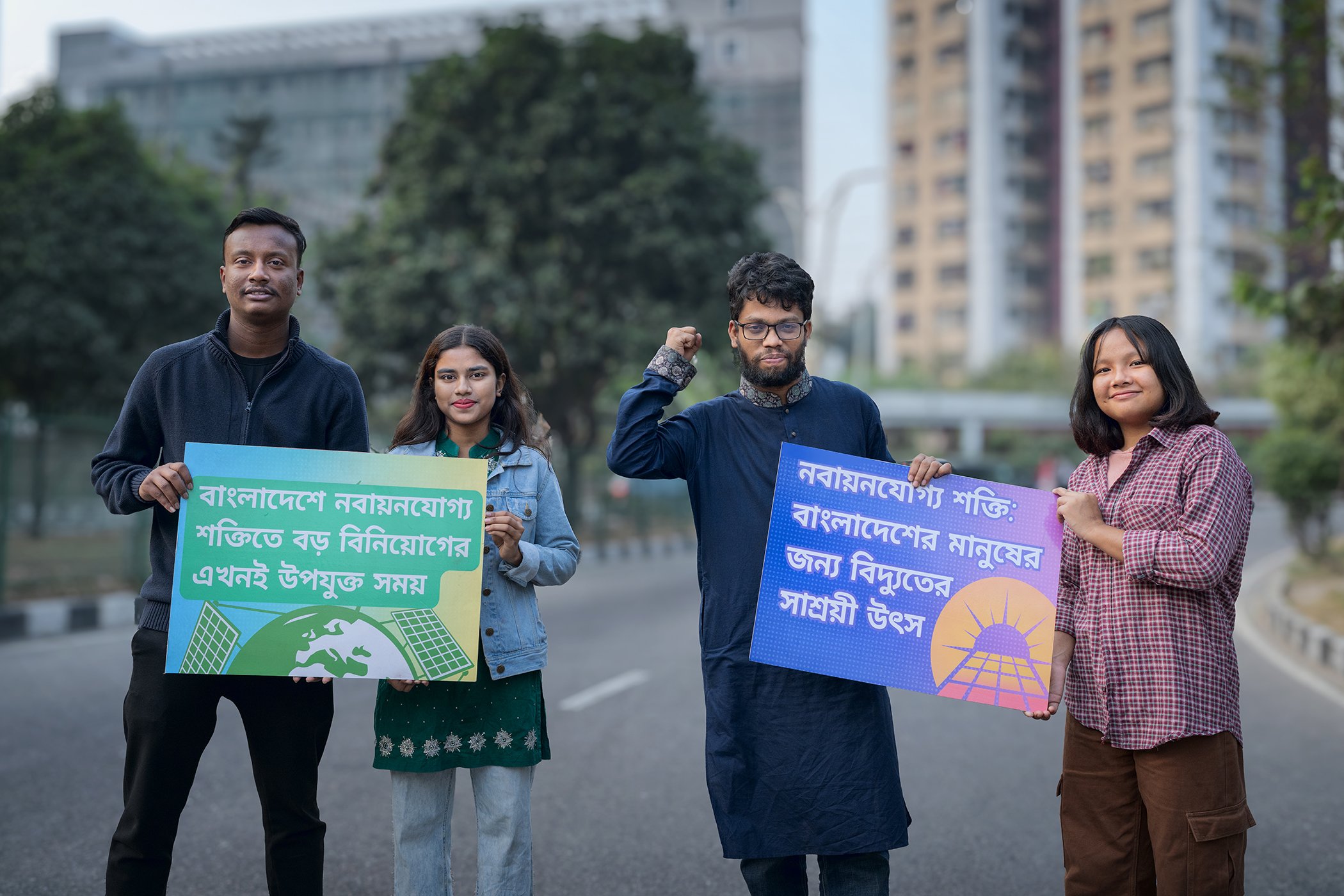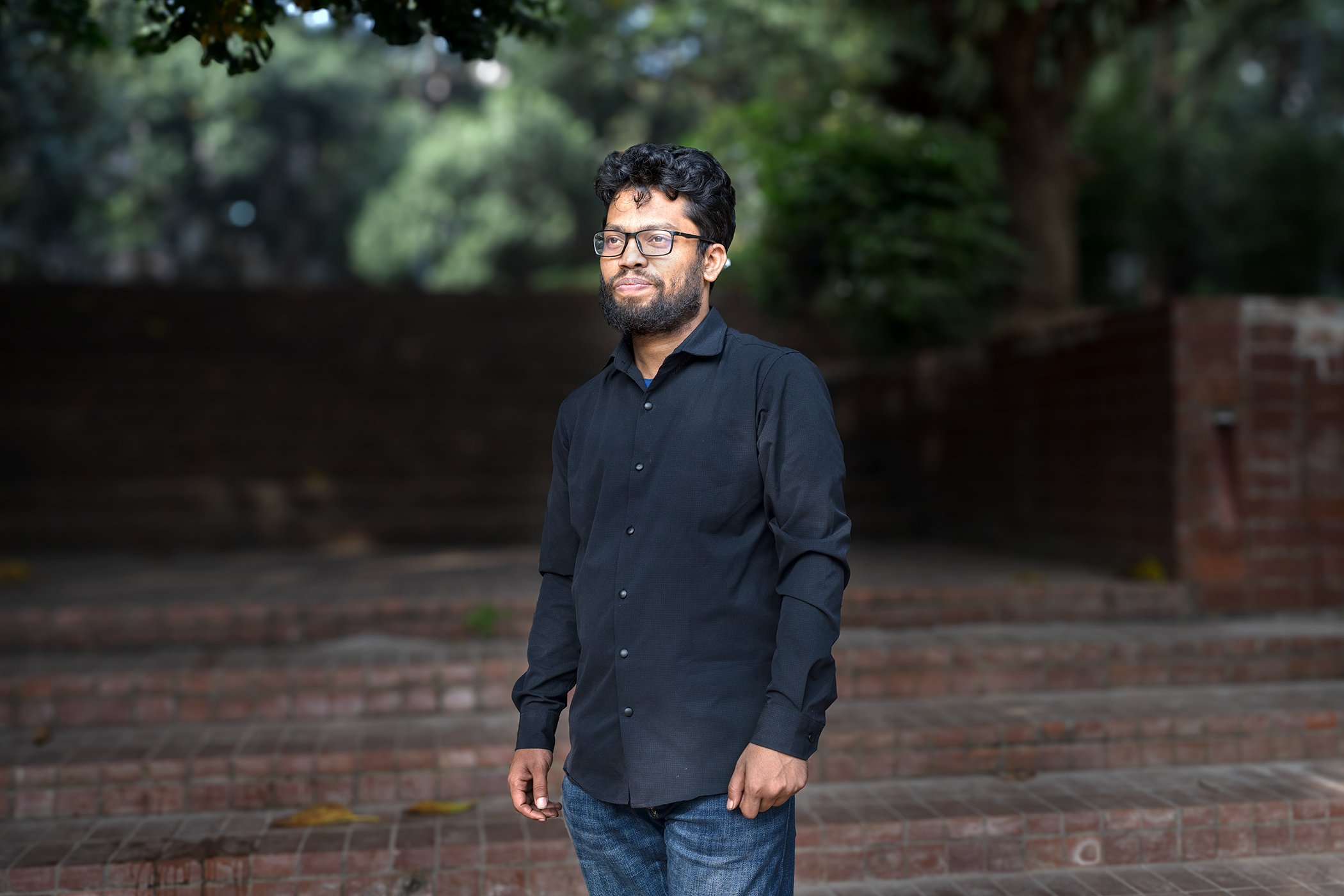Sohanur Rahman is a passionate advocate for climate justice, social change, and youth empowerment from Bangladesh where civic space is closed. He is also a Young Activist Summitlaureate for 2024. Here, Rahman shares how he helps address the challenges facing vulnerable communities, particularly in rural Bangladesh.
Growing up I saw the impact of poverty, inequality, and environmental degradation firsthand.
I was acutely aware of how climate issues and social injustices affected young people and women, often placing them at the forefront of these challenges. These early encounters fueled my determination to bring about meaningful change and engage in efforts that empower the voices of youth and marginalized communities. As such, I’m always motivated to amplify the perspectives of those too often left unheard.
My journey into activism began…
…with a deep sense of justice and responsibility to support those facing hardship, especially in the face of climate change.
Growing up, I saw how young people in my community struggled with poverty, limited education, and the impact of environmental degradation. My commitment intensified when I witnessed a powerful cyclone devastate my village, leaving families homeless and exposing the vulnerability of communities on the frontline of the climate crisis. One memory that especially drove me was of Char Anda island in Coastal Bangladesh, where residents were enduring the worst effects of climate change without access to education, nutrition, or stable shelter. They were paying the highest price for a crisis they did not cause.
"...climate change exacerbates existing social and economic inequalities, pushing the most marginalized communities further into poverty."
I first truly realized the impact of climate change on Bangladesh…
… during my childhood, I grew up in a rural area frequently hit by natural disasters.
I remember the intensity of cyclones and floods that submerged entire villages, forcing families to leave their homes as they and how cyclones swept away the lives and livelihoods of people around me. It was heartbreaking to see people — many farmers or fisherfolk- losing everything overnight, only to rebuild and face the same threats again the next season. These experiences opened my eyes to the harsh reality that climate change wasn't just an environmental issue but a daily struggle for survival, especially for vulnerable communities.
As I got older, I began to understand how climate change exacerbates existing social and economic inequalities, pushing the most marginalized communities further into poverty. Witnessing these struggles gave me a sense of urgency and a purpose: I wanted to find ways to address the systemic problems that make climate impacts so devastating, especially in a country like Bangladesh, where many people depend on climate-sensitive resources like agriculture and fishing.
Over time, I became aware of another consequence of these climate impacts: child marriage.
With frequent climate-induced disasters, many families are pushed deeper into poverty, sometimes seeing child marriage as a last resort for security. I realized that tackling climate change must go hand-in-hand with addressing social issues like child marriage, which is often fueled by the desperation brought on by recurrent disasters.
This realization led me to establish YouthNet, with a mission to advocate for climate justice, empower communities, and address the root causes of these social issues. I wanted to create a movement where young people lead the fight, not just for climate action, but for social equity and the protection of vulnerable communities from issues like child marriage. Through YouthNet, I aim to give young people the tools and voice to advocate for a just, resilient future where no one has to suffer from or be forced into harmful practices due to climate impacts.
I am working as the Executive Coordinator of YouthNet Global.
 Sohanur Rahman is pictured with some of his fellow activists and colleagues in Dhaka, Bangladesh in December 2024. Sohanur founded YouthNet for Climate Justice to raise awareness on climate issues among younger generations and to mobilize action.
Sohanur Rahman is pictured with some of his fellow activists and colleagues in Dhaka, Bangladesh in December 2024. Sohanur founded YouthNet for Climate Justice to raise awareness on climate issues among younger generations and to mobilize action.
We focus on the intersections of climate justice, social equity, democratic rights, and youth-led climate adaptation. My role has expanded to national and international advocacy, where I actively engage with Bangladesh’s Interim Government to prioritize the climate agenda within the core of its reform process. I advocate for climate resilience to be central in our national policies, ensuring that reforms address environmental sustainability and social justice. In July this year, I, along with YouthNet, joined a youth-led uprising calling for democratic reform and greater accountability from the government, particularly addressing the policies of then Prime Minister Sheikh Hasina’s administration. This year, the new Bangladesh interim Government appointed me as the official youth delegate to the Bangladesh Party. It included me in the technical committee responsible for developing the country’s position paper for COP29 in Baku.
YouthNet is also leading…
…youth-driven climate adaptation initiatives in Bangladesh’s climate-vulnerable regions. Our programs, such as Y-Just, empower young people to drive a just transition that includes all communities affected by climate change. Additionally, our EcoMen project engages men and boys to support social and environmental resilience. I am also a member of the Youth Democracy Cohort, working to amplify young voices in democratic processes through platforms like the Bangladesh Model Youth Parliament, which enables young people to learn about policy-making, engage in civic dialogue, and advocate for their rights. I strive to ensure that climate policies and adaptation strategies are developed inclusively through national and international platforms, addressing immediate climate needs and systemic inequalities to create a sustainable and democratic future.
"Although I haven’t faced direct violence, I’ve experienced moments of intimidation, and I know others who’ve been harassed or worse."
Being an activist in Bangladesh involves navigating significant challenges.
This environment makes it difficult for activists to openly speak out on sensitive issues like democratic reform, human rights, and climate justice. As an advocate, I frequently face these constraints, especially as our work often involves challenging policies that negatively affect marginalized communities. Regulations, like the Foreign Donations (Voluntary Activities) Regulation Act, create bureaucratic hurdles for non-governmental organizations, limiting our ability to operate independently and making us vulnerable to selective targeting. This can restrict funding, advocacy, and even local support, especially for organizations working on governance and rights.
While I push for freedom of expression, I am constantly mindful of the risks. Speaking up about government accountability or democratic reform can be dangerous; activists are often labeled “anti-national,” or “foreign agents,” or “anti-government” simply for questioning policies or demanding transparency. Although I haven’t faced direct violence, I’ve experienced moments of intimidation, and I know others who’ve been harassed or worse. There’s always a tension — a persistent worry of backlash.
However, after the recent youth-led uprising, there is renewed hope. The new interim government has shown signs of openness to reform, bringing a sense of optimism. There’s a stronger possibility now that our calls for climate action and democratic reform will be taken seriously. This shift is encouraging.
One of the key areas that need reform is youth co-leadership and the facilitation of funding to youth-led organizations. There is a pressing need for easier access to funding for young people leading change in their communities. Many youth-led organizations struggle with complicated bureaucratic processes to access funding, which limits their ability to grow and implement impactful projects. Simplifying these processes and ensuring youth-led organizations receive the support they need will empower young leaders to address climate change and social justice issues more effectively. Youth co-leadership is essential, as it creates space for young people to take charge of decisions that directly affect their future, particularly in areas like climate adaptation and sustainable development.
In the meantime, I remain committed to the work, inspired by the resilience of communities and the courage of youth who continue to speak out. Even with limited civic space, we’ve found ways to amplify our voices, sometimes through international platforms, to push for the change we need.
 Climate justice advocate Sohanur Rahman, pictured here in Dhaka, Bangladesh in December 2024, was just honored at the Young Activists Summit held at the United Nations Palais des Nations in Geneva.
Climate justice advocate Sohanur Rahman, pictured here in Dhaka, Bangladesh in December 2024, was just honored at the Young Activists Summit held at the United Nations Palais des Nations in Geneva.
Activists like me need essential resources and support.
We need the freedom to express ourselves openly without fear of retaliation and legal protections to safeguard our rights. Access to funding for youth-led initiatives must be streamlined, removing bureaucratic hurdles that prevent us from focusing on our advocacy. In addition, solidarity through networks of like-minded individuals and organizations strengthens our collective impact. At the same time, ongoing training ensures we have the skills necessary to navigate complex issues like climate change and democratic reform.
Mental health support and resilience-building are crucial for preventing burnout, as the emotional toll of activism can be heavy. Finally, inclusive platforms that allow us to engage directly with policymakers and the public are vital for creating systemic change. With these tools and support systems, activists can continue to drive positive change in challenging contexts, empowering youth and ensuring the climate agenda remains a priority for all.
This article, as narrated to Gugulethu Mhlungu, has been slightly edited for clarity.
If you want to contact and explore supporting Sohanur and the Youthnet you may contact youthnetglobal@gmail.com
The 2024-2025 In My Own Words Series was made possible thanks to funding from the Ford Foundation.